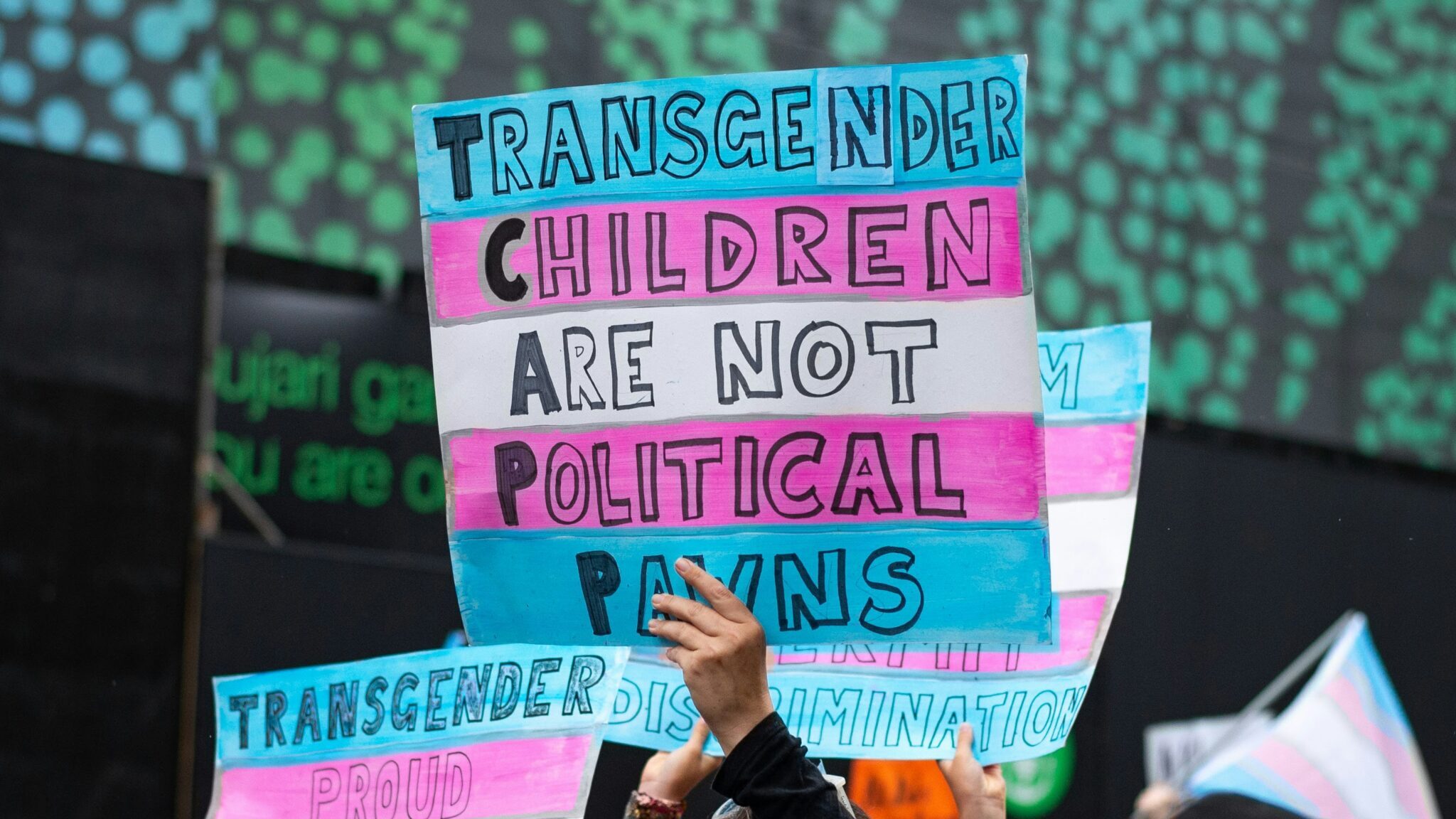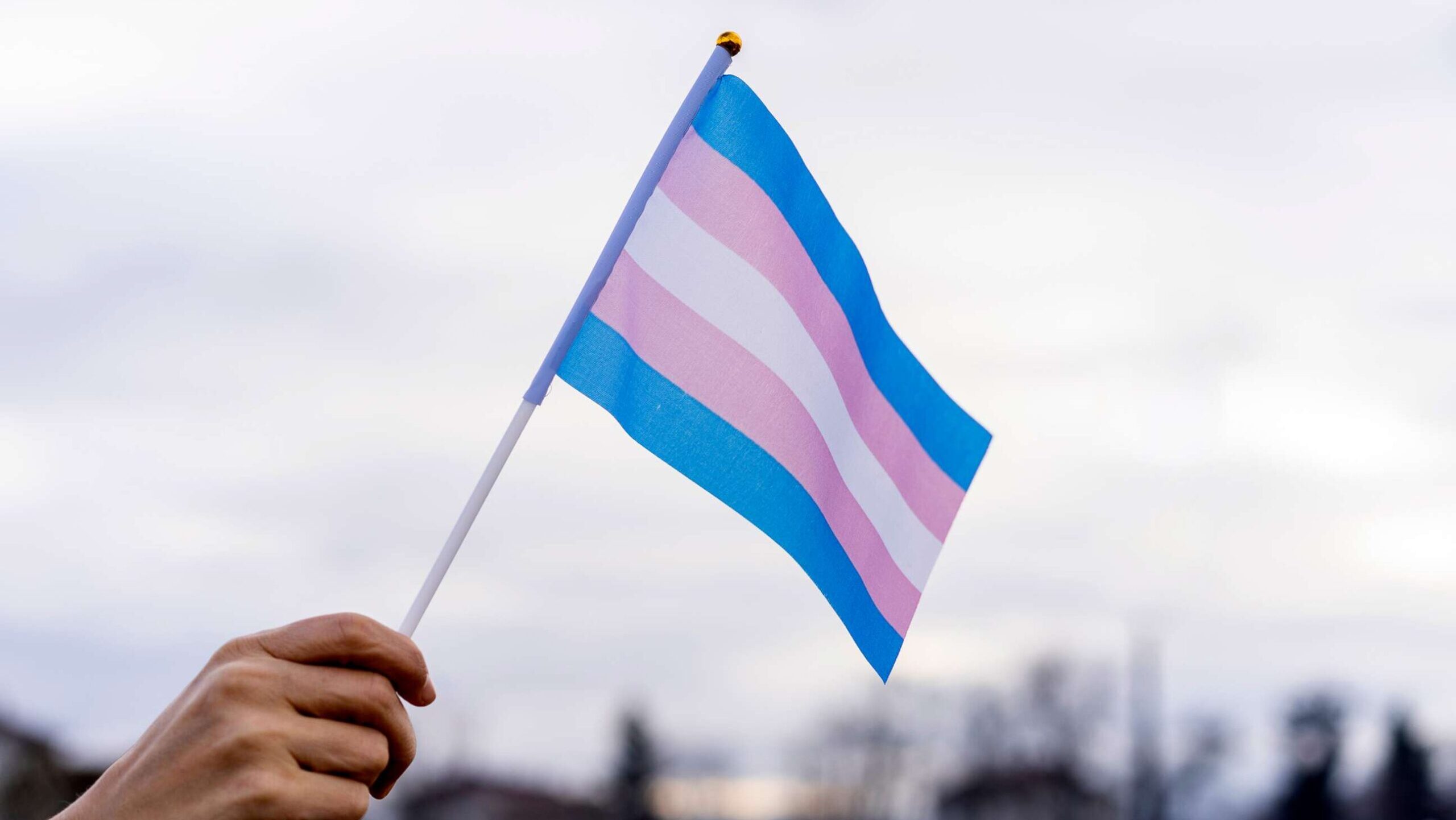Brandi Evans had two minutes to testify against it.
“If this bill is passed, it could kill my son,” she said.
In a few words, she told legislators how her 14-year-old son Andrew had lived with severe depression before he started testosterone treatments. She kept next to her a stack of articles printed from academic journals that she said proved how harmful it can be to deny trans youth gender-affirming care. She didn’t once look up at the lawmakers in front of her until she pleaded with them to vote against the bill, for the sake of her son and other trans kids in Arkansas.
“He is now able to live a happy and normal life as his authentic self,” she told lawmakers. “You will be taking that away from him, and it will cause him his imminent death.”
Evans had anticipated that the bill would pass. She quickly scheduled a mastectomy for her son. She located a doctor in Louisiana where Andrew could continue his testosterone treatments and an out-of-state pharmacy that could fill his prescriptions. She started raising money with other parents of trans kids to bus them to Louisiana if they couldn’t get the care they needed in their home state.
The bill, which
became law in April, was
blocked by a federal judge this week — a “huge relief,” Evans told CNN, if a temporary one. She’s not letting her guard down just yet, though.
“While it would be another out-of-pocket cost, I’d rather pay through the nose,” she said of her child’s health care costs if the bill had remained in effect. “That [price] pales in comparison to these children’s lives.”
CNN spoke to Evans and three other parents of transgender kids and teens whose lives revolve around advocating for their children in a year when
more than 30 states have introduced legislation that targets trans young people.
Much of this legislation aims to block trans youths’ access to school sports, restrooms and health care
that the American Medical Association has called “medically necessary,”
be it through hormone therapy or medication that temporarily blocks puberty.
Activism is an organic extension of being parents who would do anything for their child — kids who love “Minecraft” or gymnastics or bad jokes, not keeping track of the 2021 legislative session.
It’s exhausting, incessant, heartbreaking work to defend your child’s right to compete in their favorite sport at school or to get hormone therapy that makes them feel more like themselves, the parents said — but it’s essential to keep going. They’ll fight for their children as long as it takes for all trans people to feel safe and affirmed.
How they became their child’s loudest advocate
All four parents said their activism just kind of happened. They wanted to protect their kids, they found groups of likeminded people and spoke out against anti-trans policies. The fact that they were often elevated by national organizations for their advocacy work wasn’t as important as doing the work itself.
State legislatures’ recent focus on the rights of transgender children — involving debates over whether some are too young for gender-affirming health care or whether it’s “unfair” to cisgender students to compete against trans athletes — gave their activism a new urgency, the parents said.
Evans said she was “thrust onto this national stage” when she testified against the
Arkansas bill (called the “Save Adolescents from Experimentation Act”). In the whirlwind few months since her March testimony, she’s been approached by the American Civil Liberties Union and national news outlets that heard her speak.
“I was happy just working in the background — then this happened,” she told CNN with an incredulous laugh. “I’ve always been an ally, but I never thought of myself as an activist.”
Before her son came out, Lizette Trujillo was “doing all the right things”: She was the first person in her family to attend college. She’d married, had a child and ran a small business. Her life in Tucson, Arizona, was her little slice of the “American dream,” she said.
Her son, Danny, told her he was trans around the same time her husband was waiting to receive his citizenship, Trujillo said. It was a stressful time that made her realize how vulnerable her son was to discrimination. After joining a group of fellow parents of trans kids, she grew more outspoken against policies that target trans people, she said.
“It felt really frustrating to be in a space where, you know, from an intersectional lens [with both trans and Latino identities], you’re always behind” in terms of personal success and societal acceptance, she said. “To know that the system doesn’t work in your favor … it angered me.”
Anger has played a role in all four parents’ efforts to speak out against transphobia. Stephen Chukumba of New Jersey told CNN he’d never considered what it meant to be trans until his son, one of his four children, came out as trans. He quickly caught up on the proper vocabulary and history and learned the myriad ways in which trans Americans have been excluded from society.
“I found myself really incensed by it,” he said of transphobia. “I just can’t sit idly by.”
Amber Briggle would agree. It was rage that spurred the owner of a massage business to
alert local media in 2016 to a Facebook post by a candidate for sheriff in Denton County, Texas, in which he endorsed physical violence against transgender people.
The same year, she invited the
state attorney general who criticized trans-inclusive policies to her house for
dinner with her husband, daughter, and her son, Max, who is trans.
She may not have changed the attorney general’s mind that night, she said, but her dinner did get the attention of the Human Rights Campaign, with whom she helped create the Parents for Transgender Equality National Council. She did a TEDx Talk, too, about supporting her son’s transition and started a blog about what it meant to be his mother in a state
with hostile policies toward trans people.
Writing was a release between her visits to the Texas Capitol and regular attendance at protests (especially this year, when the Texas legislature introduced a
slew of anti-trans bills)
and a way for readers to get to know a trans child — “it’s hard to hate up close,” she said.
“I think activism is equal parts anger and love,” she said. “I just operate from there. You just keep moving. We have no choice.”
Their children are more than their gender identity
When asked about their children, all four parents are effusive and proud, gushing about their sons’ stellar grades and athletic prowess. Their children are resilient and mature beyond their years — but beyond the tough front they put on to face the world, they’re just kids, the parents emphasized.
Trujillo’s only child, Danny, is a “super happy” kid about to turn 14. He drums, he skateboards and he commands a basketball court. It’s been thrilling, she said, to watch him develop his music taste (he just discovered Nirvana) and personal style — the small but significant pieces that will make him more of who he is.
Chukumba says that of his four kids, his trans child — whom CNN agreed not to name to protect his privacy —
is the one who never needs to be told twice to take out the trash or leave the recycling bin at the curb. His son has taught himself the flute, bass, ukulele and piano, Chukumba said. He’s a jokester, too: The high school freshman will walk into a room, drop a “
dad joke” and wait for the groans to roll in, something he gets from his dad.
“He is a kind soul — he’s a person who goes out of his way to help other people,” Chukumba said. “When it comes to this particular dude, yeah, I’m riding with this dude ’till the wheels fall off.”
Briggle’s son Max is an accomplished athlete — he’s a gymnast and a second-degree black belt in Taekwondo who defies gravity on the regular (he can do “a zillion back flips in a row,” she said). He loves his sister so much that he volunteered to continue remote learning to keep her company even after his school reopened because she has a history of respiratory issues, Briggle said. He’s sensitive, friendly, considerate — a “model child,” Briggle said.
The fact that Max is trans is part of him, but not all of him, his mother said.
“[Max] would rather be famous for a million different things than this,” Briggle said. “I want people to see him as this incredible musician slash athlete slash cat lover slash straight-A student.”
Evans said she, too, wants her son to be recognized for all the things that make him who he is, not just being trans.
“While my child is trans, and he’s put in a box of being a trans person, he’s so much more than that label,” she said. ‘He’s just your average teenage kid trying to navigate adolescence, school, friends — he’s just an ordinary child.”
How they supported their child before and after they came out
All four parents unequivocally support their children, though some said they could have been better allies in the beginning of their sons’ transition.
“I would say I failed at first, although my kid laughs when I say that,” Trujillo said.
From the time her son was 2, he showed her in different ways that he was a boy, Trujillo said. He’d draw himself as a boy and leave LEGO figures of boys around the house to hint at the way he saw himself, he told her. When she finally overheard Danny’s friends use “him” in reference to her son, “all the puzzle pieces fell into place,” she said.
Danny was 8 when he socially transitioned, and Trujillo immediately affirmed him. Before he formally came out, she said she didn’t see him as trans because she worried that she’d say the wrong thing or damage Danny in some way. But once he transitioned, she realized he knew himself better than she did.
Briggle said she’d do “a million things differently” now than she did when her son came out. For one thing, she said, he’d been “expressing that he was a boy” since he was 2-and-a-half, but she didn’t understand what he was trying to tell her.
Max is 13 now, and there are more resources for trans children and their parents than there were when he came out in first grade. Briggle said at the time, she thought she and her husband “were the only people in the entire world with a transgender child.”
Briggle initially told her family’s story through her lens in her TEDx Talk and on her blog. She’s stopped writing as much from her perspective, instead focusing primarily on Max and his achievements, but she still maintains a level of control so she can protect him. She’ll gladly take the brunt of the online cruelty, she said, while she shows the world how amazing her son is.
The challenges and joys of being a trans person of color
Trujillo said her son’s existence sits at multiple intersections. He’s the trans Latino son of an immigrant — Trujillo’s husband moved to the US from Mexico as a boy — qualities that she fears will expose him to hatred.
While Trujillo said she tries to shield Danny from the hate so he can focus on school, friends and other 14-year-old stuff, he’s old enough to read up on the offensive things people say about kids like him. He’s old enough to advocate for himself, too, but when she can, she shoulders that burden for him, she said. The weight of it is nearly crushing.
“It’s exhausting, I can tell you,” she said. “I’m tired.”
At the same time, though, Trujillo and her family take pride in their identities.
“When you’re talking about marginalized identities, there’s honestly a lot of joy and pride at existing, as well,” Trujillo said. “For as tiresome as it is, when people talk about trans youth being resilient, that’s something I emphasize highly … I see my son and I realize that he’s resilient, as well.”
Chukumba said that, aside from being trans, being Black puts a “target on [his son’s] back.” He tries to teach all four of his kids how to live in a world where they may be seen as less than.
“The danger is ever-present,” he said. “How to navigate that, I think, becomes a part of how I’m raising my children.”
He does some work to undo those biases and dangers among parents, too: He joined the Human Rights Campaign’s Parents for Transgender Equality National Council (the group Briggle helped launch) to reach Black parents who’ve struggled to support their trans children, he said.
“I want to let [Black trans young people] know they’re not alone, there are people out here who understand those struggles, who support them,” he said.
How they balance the pain with the positives
Between the rage and exhaustion of advocating for their trans children, the parents said there is still joy and hope to be found.
Trujillo said the vigor she sees in today’s trans youth “refuels” her. They’re “incredibly brave people, true to themselves,” she said, whose sense of who they are is stronger than hers was when she was Danny’s age.
It’s easy to break down and become overwhelmed by the stress of protecting her family, Trujillo said, so she works hard to hold onto the happiness when it comes.
Evans keeps one eye on the future — she said several times she’ll battle the Arkansas law all the way to the US Supreme Court if she has to — and another on her son’s day-to-day wellbeing. She’ll ask him daily how he’s feeling and whether he needs more support than she can give him as his mother.
“It’s just one of those things that I have to keep in the backburner of my mind, that I have to check on him regularly to make sure he’s OK,” she said. “I won’t lose my child to this. I refuse.”
Constantly defending her child before legislators requires Briggle to “compartmentalize” her pain, she said. It would hurt too much to think about the legislators who want to pass a bill that would qualify her consenting to gender-affirming care for Max as child abuse. So it doesn’t interfere with her protests or trips to the Texas Capitol or daily life as a mom, wife and business owner, she keeps it locked away.
“I have not unpacked how traumatized we all are,” she said of her family’s experience.
Briggle and Evans said they had considered moving out of their states for the sake of their children even before the passage of recent anti-trans bills. But for now, they’re staying put, they said.
Evans said she doesn’t have the means to relocate her family. Besides, if her voice and the voices of other trans advocates disappear from Arkansas, she fears no one will take up the mantle.
“Even if we did have the means to do that, I don’t think I would,” she said. “Because if we all pick up and leave, if we all just left the state of Arkansas, [politicians] will do what they want without a fight. What marginalized community are they going to come after next?”
Briggle said she’d do anything to protect Max, including moving. But it’s almost not worth the hassle, she said, because no matter where her family heads, she fears anti-trans sentiment will follow. Bills that limit the rights of young trans people have been
introduced in more than 30 states this year alone, a number Briggle fears will only increase over time.
They work toward a safer future for their kids
Though it’s often exhausting work to protect her child from anti-trans hate, it’s been worth it, Trujillo said. Her son is happy, healthy and thriving.
“The thing that I’m most proud of — my son has been able to feel it very minimally,” she said. “He’s still able to be a kid, to be himself and enjoy the summer.”
More than anything, Chukumba wants his son to love himself and to look and feel the way he wants to. The teen just started testosterone hormone therapy, Chukumba said, which he sees as a substantial step toward his self-actualization.
“I want him to be the person he sees himself in his head, and I want him to be happy,” he said. “That’s all any parent would want for their kid.”
Evans is relieved that the Arkansas law is temporarily blocked. There’s still a long way to go, she said, “but this gives [her] hope.”
“I’ll fight this ’til the end, until the state is taken down in court, whatever level of court they have to go through,” she told CNN in a June interview before the bill was blocked. “It needs to be done and seen through. If we all just pick up and leave, then they won. And I will not let a bully win.”
The four parents who spoke to CNN are some of the public faces of the movement against anti-trans legislation, but they emphasized that any parent of a trans child is an activist in their own right.
Parents advocate on behalf of their trans child when they approach their school principal on how to make their child’s classroom welcoming. They defend their child to fellow parents who have questions and to doctors who can provide their children gender-affirming health care. They teach their children that this world is theirs, too, and they’re trying to make it better for them.
“We are all — all of us — doing this work,” Briggle said. “I don’t know a single parent of a trans child who would not walk through hell and back” for their child.









